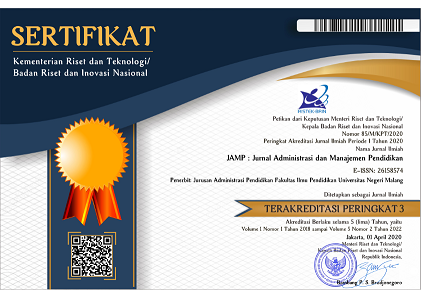ANALISIS PERILAKU KEPEMIMPINAN KEPENDIDIKAN KEPALA SEKOLAH DI INDONESIA
Abstract
Abstract: The purpose of this study is to find statement items that can measure accurately and at the same time find statement items that can be submitted as materials for improving educational leadership in schools. This study used a quantitative research design with data obtained through a research instrument filled with 449 teachers from Indonesia through purposive sampling method and data analysis techniques using Rasch modeling. Before the questionnaire is used, it first gets input from the expert and it tested on 10 teachers. The findings of this research are: (1) There are 11 items are stated to measure accurately the variable of the principal's educational leadership; (2) There are priorities for improving educational leadership in schools, namely: (i) increasing respect for all differences (diversity) in schools; (ii) the principal should provide inspiration in implementing the best education; (iii) school principals should be more collaborative in the success of school programs; (iv) the principal should be better able to resolve internal conflicts in schools
Keywords: leadership behavior; educational leadership; Rasch Model
Abstrak: Tujuan dari penelitian ini yaitu menemukan butir-butir pernyataan yang dapat mengukur dengan tepat sekaligus menemukan butir pernyataan yang dapat diajukan sebagai bahan perbaikan kepemimpinan pendidikan di sekolah. Penelitian ini menggunakan rancangan penelitian kuantitatif dengan data diperoleh melalui instrumen penelitian yang diisi oleh 449 guru dari wilayah Indonesia melalui metode purposive sampling dan teknik analisis data menggunakan Pemodelan Rasch. Sebelum instrumen digunakan terlebih dahulu mendapat masukan dari ahli (expert judgement) dan diujicobakan kepada 10 guru. Adapun temuan penelitian ini yaitu: (1) Sebanyak 11 butir dinyatakan dapat mengukur dengan tepat (fit) variable kepemimpinan pendidikan kepala sekolah; (2) Prioritas tindakan untuk memperbaiki kepemimpinan pendidikan di sekolah yaitu: (i) meningkatkan penghormatan pada segala perbedaan (keberagaman) di sekolah; (ii) kepala sekolah hendaknya memberikan inspirasi dalam pelaksanaan pendidikan terbaik; (iii) kepala sekolah hendaknya lebih kolaboratif dalam menyukseskan program-program sekolah; (iv) kepala sekolah hendaknya lebih mampu menyelesaikan konflik internal di sekolah dengan baik
Kata kunci: perilaku kepemimpinan; kepemimpian pendidikan; Rasch Model
Full Text:
PDFReferences
Abdaziz, A., Jusoh, M. S., & Amlus, H. (2014). Construct Validity : A Rasch Measurement Model Approaches. Journal of Applied Science and Agriculture, 9(September), 7–12.
Adro, N., Leit, C., & Jos, F. (2020). International Journal of Innovation Studies Leadership and organizational innovation in the third sector : A systematic literature review. International Journal of Innovation Studies, 4, 51–67. https://doi.org/10.1016/j.ijis.2020.04.001
Ariratana, W., Sirisookslip, S., & Keow, T. (2015). Development of Leadership Soft Skills Among Educational Administrators. Procedia - Social and Behavioral Sciences, 186, 331–336. https://doi.org/10.1016/j.sbspro.2015.04.016
Auvinen, E., Huhtala, M., Kinnunen, U., Tsupari, H., & Feldt, T. (2020). Leader motivation as a building block for sustainable leader careers : The relationship between leadership motivation profiles and leader and follower outcomes. Journal of Vocational Behavior, 120(December 2018), 103428. https://doi.org/10.1016/j.jvb.2020.103428
Baghaei, P. (2014). The Rasch Model as a Construct Validation Tool. Rasch Measurement Transactions, 22(1).
Bambang Sumintono, W. W. (2014). Aplikasi Model Rasch Untuk Penelitian Ilmu-Ilmu Sosial. Cimahi: Trim Komunikata.
Bambang Sumintono, W. W. (2015). Aplikasi Pemodelan Rasch pada Asesment Pendidikan. Cimahi: Trim Komunikata.
Barus, G., Sinaga, J. D., & Moron, Y. D. (2019). Testing the quality of film-based creative and innovative character education test with rasch model. Jurnal Konseling Dan Pendidikan, 7(2), 71–80.
Bond, T. G., & Fox, C. M. (2007). Applying the Rasch Model : Fundamental Measurement in the Human Sciences Second Edition University of Toledo. New Jersey 07430: Lawrence Erlbaum Associates, Inc.
Boone, W. J., & Staver, J. R. (2020). Advances in Rasch Analyses in the Human Sciences. Switzerland: Springer Nature Switzerland AG.
Boone, W. J., Staver, J. R., & Yale, M. S. (2014). Rasch Analysis in the Human Sciences. London: Springer.
Boulu-reshef, B., Holt, C. A., Rodgers, M. S., & Thomas-hunt, M. C. (2019). The impact of leader communication on free-riding : An incentivized experiment with empowering and directive styles. The Leadership Quarterly, (November 2017), 101351. https://doi.org/10.1016/j.leaqua.2019.101351
Breesawitz, S. R., Lincoln, N., & States, U. (2019). Conflict and Criticism : The Role of Leaders in Influencing Environmental Behavior. Encyclopedia of the World’s Biomes. Elsevier Inc. https://doi.org/10.1016/B978-0-12-409548-9.11935-9
Brinkman, W.-P. (2009). Design of a Questionnaire Instrument. Handbook of Mobile Technology Research Methods, (December), 31–57.
Brown, C., & Flood, J. (2020). The three roles of school leaders in maximizing the impact of Professional Learning Networks : A case study from England. International Journal of Educational Research, 99(August 2019), 101516. https://doi.org/10.1016/j.ijer.2019.101516
Bush, T. (2007). Educational leadership and management : theory , policy , and practice. South African Journal of Education, 27(3), 391–406.
Carvalho, L. D. F., Primi, R., & Meyer, G. J. (2012). Application of the Rasch model in measuring personality disorders. Trends, 34(2), 101–109.
Choi, E. H., Kim, E., & Kim, P. B. (2018). Effects of the Educational Leadership of Nursing Unit Managers on Team Effectiveness : Mediating Effects of Organizational Communication. Asian Nursing Research, 12(2), 99–105. https://doi.org/10.1016/j.anr.2018.03.001
Daniëls, E., Hondeghem, A., & Dochy, F. (2019). A review on leadership and leadership development in educational settings. Educational Research Review, 27(December 2018), 110–125. https://doi.org/10.1016/j.edurev.2019.02.003
Dina, A.-T. (2013). Challenges faced by educational leadership on influencing student learning. Procedia - Social and Behavioral Sciences, 93, 290–295. https://doi.org/10.1016/j.sbspro.2013.09.192
Dorman, B. J. F. and J. P. (2011). Applications of Rasch Measurement in Learning Environments Research. ROTTERDAM/BOSTON/TAIPEI: SENSE PUBLISHERS.
Ewen, C., Wihler, A., Blickle, G., Oerder, K., Iii, B. P. E., Douglas, C., & Ferris, G. R. (2013). Further specification of the leader political skill – leadership effectiveness relationships : Transformational and transactional leader behavior as mediators. The Leadership Quarterly. https://doi.org/10.1016/j.leaqua.2013.03.006
Flatau-harrison, H., Griffin, M. A., & Gagné, M. (2020). Trickling down : The impact of leaders on individual role clarity through safety climate strength across time. Safety Science, 121(August 2018), 485–495. https://doi.org/10.1016/j.ssci.2019.09.009
Ghazali, N. H. M. (2016). A Reliability and Validity of an Instrument to Evaluate the School-Based Assessment System : A Pilot Study. International Journal of Evaluation and Research in Education (IJERE), 5(2), 148–157.
Goig, R., Mart, I., & Gonz, D. (2020). Strategies for Attention to Diversity : Perceptions of Secondary School Teaching Sta ff. Int. J. Environ. Res. Public Health, 17(3840).
Graham, K., Hudson, P., & Willis, J. (2014). How can principals enhance teacher job satisfaction and work commitment ? Paper Presented at the Australian Association of Research in Education (AARE) Conference, Brisbane, Australia.
Harvey, G., Kelly, J., Kitson, A., Thornton, K., & Owen, V. (2019). Leadership for evidence-based practice—Enforcing or enabling implementation? Collegian. https://doi.org/10.1016/j.colegn.2019.04.004
Haryani Diyati, M. (2014). Peran Kepemimpinan Kepala Sekolaj dalam Pengembangan Budaya Sekolah di SDN Kwanyuhan, Kecamatan Minggir, Sleman. JUrnal Akuntabilitas Manajemen Pendidikan, 2(1), 28–43.
Hendriks, J., Fyfe, S., Styles, I., Skinner, S. R., Merriman, G., & Hendriks, J. (2012). Scale construction utilising the Rasch unidimensional measurement model : A measurement of adolescent attitudes towards abortion. Australasian Medical Journal [AMJ 2012, 5(5), 251–261.
Hidayat, R. (2017). PERILAKU ETIS DOSEN DALAM PERSPEKTIF EFIKASI DIRI, KEPEMIMPINAN, DAN KOMUNIKASI INTERPERSONAL. P E D A G O N A L Jurnal Ilmiah Pendidikan, 1(1), 37–44.
Hu, Y., & Broome, M. (2020). Leadership characteristics for interprofessional collaboration in China. Journal of Professional Nursing, (August 2019), 0–1. https://doi.org/10.1016/j.profnurs.2020.02.008
Humphrey, N., Bartolo, P., Ale, P., Calleja, C., Hofsaess, T., Janikova, V., … Wetso, G. M. (2006). European Journal of Teacher Education Understanding and responding to diversity in the primary classroom : an international study. European Journal of Teacher Education, 29(3), 305–318. https://doi.org/10.1080/02619760600795122
Jesyca R.T. Muaju, Adi Setiawan, T. M. (2013). Uji Validitas dan Reliabilitas Menggunakan Metode Boostrap pada Kuisioner Ripe Yes/No Questions. In Prosiding Seminar Nasional Sains dan Pendidikan Sains VII (p. 513).
Jiang, J., Gu, H., Dong, Y., & Tu, X. (2018). International Journal of Hospitality Management The better I feel , the better I can do : The role of leaders ’ positive a ff ective presence. International Journal of Hospitality Management, (February), 0–1. https://doi.org/10.1016/j.ijhm.2018.09.007
Jusoh. (2018). Construct Validity for Measuring Entrepreneurial Readiness Among Malaysian Higher Education Students : A Stochastic Measurement Model Approach. In MATEC Web of Conferences 150, (Vol. 150, pp. 1–4).
Kanat-maymon, Y., Elimelech, M., & Roth, G. (2020). Work Motivations as Antecedents and Outcomes of Leadership: Integrating Self- Determination Theory and the Full Range Leadership Theory. European Management Journal. https://doi.org/10.1016/j.emj.2020.01.003
Karacay, G., Bayraktar, S., Kabasakal, H., & Dastmalchian, A. (2019). Role of Leaders as Agents of Negotiation for Counterbalancing Cultural Dissonance in the Middle East and North Africa Region. Journal of International Management, (July 2018), 100704. https://doi.org/10.1016/j.intman.2019.100704
Keow, T., Huwaina, S., & Kanokorn, S. (2015). Soft Skills Of Leaders And School Improvement In High Performing Schools. Procedia - Social and Behavioral Sciences, 191(2011), 2127–2131. https://doi.org/10.1016/j.sbspro.2015.04.652
Koka, S., Baba, K., Ercoli, C., Fitzpatrick, B., Jiang, X., & Linda, L. (2019). Leadership in an academic discipline. Journal of Dentistry, 87, 40–44. https://doi.org/10.1016/j.jdent.2019.05.020
Kotlyar, I., Karakowsky, L., & Ng, P. (2011). Leader behaviors , con fl ict and member commitment to team-generated decisions. The Leadership Quarterly, 22(4), 666–679. https://doi.org/10.1016/j.leaqua.2011.05.007
Linacre, J. M. (2010). Predicting Responses from Rasch Measures. JOURNAL OF APPLIED MEASUREMENT, 11(1), 1–10.
Liu, Z., Venkatesh, S., Elaine, S., & Riggio, R. E. (2020). Leader development across the lifespan : A dynamic experiences-grounded approach. The Leadership Quarterly, (December 2018), 101382. https://doi.org/10.1016/j.leaqua.2020.101382
Martin, J., Nuttall, J., Henderson, L., & Wood, E. (2020). Educational Leaders and the project of professionalisation in early childhood education in Australia. International Journal of Educational Research, 101, 101559. https://doi.org/10.1016/j.ijer.2020.101559
Miao, C., Humphrey, R. H., & Qian, S. (2018). A cross-cultural meta-analysis of how leader emotional intelligence in fl uences subordinate task performance and organizational citizenship behavior. Journal of World Business, (January), 1–12. https://doi.org/10.1016/j.jwb.2018.01.003
Mohajan, H. K. (2017). Two Criteria for Good Measurements in Research: Validity and Reliability. Annals of Spiru Haret University, 17(3), 1–32.
Mohamad, M. M., Lisa, N., Sern, L. C., & Mohd, K. (2015). Measuring the Validity and Reliability of Research Instruments. Procedia - Social and Behavioral Sciences, 204(November 2014), 164–171. https://doi.org/10.1016/j.sbspro.2015.08.129
Mohammad, A. (2015). Educational Leadership : A new Trend that Society Needs. Procedia - Social and Behavioral Sciences, 210, 28–34. https://doi.org/10.1016/j.sbspro.2015.11.325
Navaridas-nalda, F., Emeterio, M. C., Fernández-ortiz, R., & Arias-oliva, M. (2020). The strategic influence of school principal leadership in the digital transformation of schools. Computers in Human Behavior, 106481. https://doi.org/10.1016/j.chb.2020.106481
NPBEA. (2015). Professional Standards for Educational Leaders 2015. National Policy Board for Educational Administration Member, (October), 1–36.
Othman, N. B. (2014). Assessing Construct Validity and Reliability Of Competitiveness Scale Using Rasch Model Approach. In The 2014 WEI International Academic Conference Proceedings (pp. 113–120).
Patras, Y. E. (2017). PENGARUH PERILAKU KEPEMIMPINAN, KEADILAN ORGANISASI DAN KETERLIBATAN KERJA TERHADAP ORGANIZATIONAL CITIZENZHIP BEHAVIOR DOSEN. Pedagonal, 1(1), 8–14.
Polat, S., Arslan, Y., & Ölçüm, D. (2017). Diversity leadership skills of school administrators : A scale development study. Issues in Educational Research, 27(3), 512–526.
Prasertcharoensuk, T., & Ngang, K. (2017). Kasetsart Journal of Social Sciences The effect of strategic leadership factors of administrators on school effectiveness under the Of fi ce of Maha Sarakham Primary Educational Service Area 3. Kasetsart Journal of Social Sciences, 38(3), 316–323. https://doi.org/10.1016/j.kjss.2016.09.001
Rahmawati, E. (2019). Developing instruments of teacher ’ s perception of critical thinking in elementary school. Journal of Education and Learning (EduLearn), 13(4), 559–566. https://doi.org/10.11591/edulearn.v13i4.13232
Salih, M., Prof, A., & Samur, Y. (2016). Leadership Styles and Technology : Leadership Competency Level of Educational Leaders. Procedia - Social and Behavioral Sciences, 229, 226–233. https://doi.org/10.1016/j.sbspro.2016.07.132
Soliman, A. F. (2020). The e ff ect of leadership empowerment on technology transfer e ff ectiveness : A proposed model : An applied study on the telecommunication companies in one of the developing countries. Journal of High Technology Management Research, (xxxx). https://doi.org/10.1016/j.hitech.2020.100371
Stef van Buuren, D. J. D. W. (2015). Measuring Psychosocial Impact of CBRN Incidents by the Rasch Model. JOURNAL OF APPLIED MEASUREMENT, 16(3).
Steffens, N. K., Peters, K., Haslam, S. A., & Dick, R. Van. (2016). Dying for charisma : Leaders ’ inspirational appeal increases post-mortem. The Leadership Quarterly, 1–13. https://doi.org/10.1016/j.leaqua.2016.09.001
Sudarno Sumarto, Nina Toyamah, Vita Febriany, R. Justin Sodo, Luhur Bima, A. A. (2014). Study on Teacher Absenteeism in Indonesia. Analytical and Capacity Development Partnership, iii.
Takaki, J., Taniguchi, T., & Fujii, Y. (2014). Reliability , Validity , and Significance of Assessment of Sense of Contribution in the Workplace. IInternational Journal of Environmental Research and Public Health, 11, 1594–1604. https://doi.org/10.3390/ijerph110201594
Tesio, Il. (2003). MEASURING BEHAVIOURS AND PERCEPTIONS : RASCH ANALYSIS AS A TOOL FOR REHABILITATION RESEARCH. J Rehabil Med, 35, 105–115.
Torres, D. G. (2019). Distributed leadership , professional collaboration , and teachers ’ job satisfaction in U . S . schools. Teaching and Teacher Education, 79, 111–123. https://doi.org/10.1016/j.tate.2018.12.001
Valeria, E. (2020). Characteristics and Skills of Leadership in the Context of Industry 4.0. Procedia Manufacturing, 43, 543–550. https://doi.org/10.1016/j.promfg.2020.02.167
Vélez, S. C., Carmen, M., Lorenzo, A., Manuel, J., & Garrido, M. (2017). Leadership : its importance in the management of school coexistence. Procedia - Social and Behavioral Sciences, 237(June 2016), 169–174. https://doi.org/10.1016/j.sbspro.2017.02.059
Widi, R. (2011). Uji Validitas dan Reliabilitas dalam Penelitian Epidemiologi Kedokteran Gigi. Stomatognatic (J.K.G. Unej) Vol., 8(1), 27–34.
Wu, M., & Adams, R. (2007). APPLYING THE RASCH MODEL TO PSYCHO-SOCIAL MEASUREMENT A PRACTICAL APPROACH. Melbourne.: Educational Measurement Solutions.
Zile-Tamsen, C. Van. (2017). Using Rasch Analysis to Inform Rating Scale. Research in Higher Education. https://doi.org/10.1007/s11162-017-9448-0
Zohrabi, M. (2013). Mixed Method Research: Instruments, Validity, Reliability and Reporting Findings. Theory and Practice in Language Studies, 3(2), 254–262. https://doi.org/10.4304/tpls.3.2.254-262
DOI: http://dx.doi.org/10.17977/um027v4i32021p220
Refbacks
- There are currently no refbacks.
Copyright (c) 2021 Rais Hidayat, Yuyun Elizabeth Patras

This work is licensed under a Creative Commons Attribution-ShareAlike 4.0 International License.


This work is licensed under a Creative Commons Attribution-NonCommercial-ShareAlike 4.0 International License.









12.png)